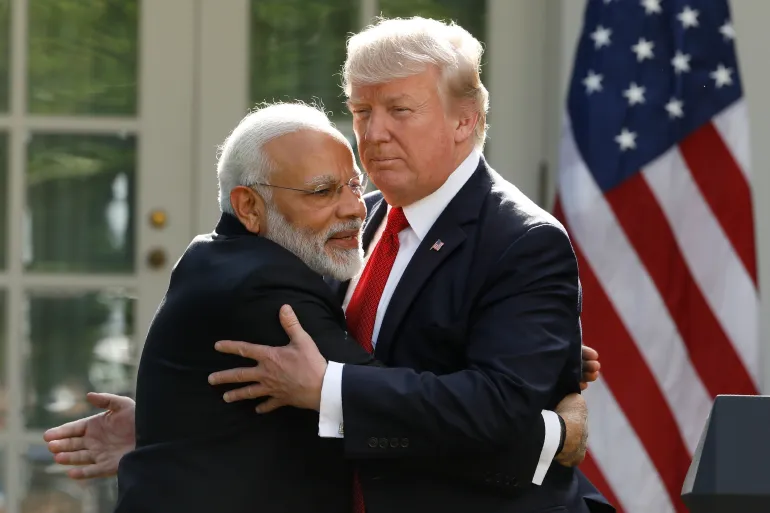Indian Prime Minister Narendra Modi arrived in Washington on Wednesday night for a high-stakes meeting with United States President Donald Trump at the White House. The visit comes at a time when U.S.-India relations are being tested by trade disagreements, deportation policies affecting Indian nationals, and a growing diplomatic rift over Iran. While both leaders have previously expressed warmth and friendship, the meeting will determine whether their partnership can withstand these mounting challenges.
India and the U.S. share a strong economic relationship, with trade between the two nations reaching a record high of $118 billion in the 2023-24 fiscal year. However, Trump has repeatedly criticized India’s trade practices, calling the country a “very big abuser” and demanding a more favorable trade balance for the United States. Currently, the U.S. runs a trade deficit with India, which stood at $45.6 billion in 2024.
In response to Trump’s aggressive stance on tariffs, India has attempted to ease trade barriers by reducing duties on several U.S. goods. Modi is expected to highlight these concessions during the meeting in an effort to avoid additional American tariffs. However, the U.S. administration remains firm on its demand for India to further open its market to American exports, particularly in sectors like agriculture, medical devices, and technology.
Trump’s broader trade policies have already impacted India, as his administration imposed a 10 percent tariff on Chinese imports and a 25 percent tariff on steel and aluminum. In 2018, a trade war erupted between the U.S. and India when Trump levied tariffs on Indian steel and aluminum, prompting India to retaliate with increased duties on U.S. products. Modi will be keen to prevent a similar standoff this time around.
The growing crackdown on undocumented immigrants under the Trump administration has added another layer of complexity to U.S.-India relations. India ranks third among countries with the highest number of undocumented immigrants in the U.S., with an estimated 725,000 Indians living illegally in the country. Recently, the deportation of 104 Indian nationals, many of whom were flown back to India in handcuffs aboard a U.S. military plane, caused public outrage. Opposition leaders in India condemned the move, calling it humiliating and inhumane.
Despite the backlash, the Indian government has taken a measured approach, with Foreign Minister S. Jaishankar stating that India respects U.S. immigration policies but will also take steps to curb illegal migration. Modi is expected to raise concerns over the treatment of Indian deportees while also seeking assurances that future deportations will be handled with greater sensitivity.
While trade and immigration are pressing issues, the disagreement over Iran may pose a more serious long-term challenge to U.S.-India relations. India has made significant investments in Iran’s Chabahar Port, a key infrastructure project that provides India access to Afghanistan and Central Asia. Under Trump’s first term, India was granted a waiver from U.S. sanctions to continue its involvement in the port project. However, the Trump administration has now ordered a review of all sanctions waivers, putting India’s investment in jeopardy.
Analysts warn that if Trump takes a hardline stance on Iran and revokes India’s waiver, it could lead to major diplomatic friction. India relies on Iranian oil imports to meet its growing energy demands, and any disruption in supply could impact its economy. Modi will likely seek to negotiate continued exemptions to safeguard India’s strategic and economic interests.
Despite these challenges, security cooperation between India and the U.S. remains strong. The two nations share a common interest in countering China’s influence in the Indo-Pacific region. Modi’s visit signals India’s strategic importance to the U.S., especially as Washington reaffirms its commitment to the Quad alliance, which includes India, Japan, and Australia.
However, recent controversies have complicated diplomatic relations. Allegations that India’s spy agency plotted an assassination on U.S. soil and the indictment of Indian billionaire Gautam Adani over bribery charges have raised concerns within Washington. While Modi enjoys a strong personal rapport with Trump, experts caution that personal ties alone will not be enough to secure favorable deals. Trump’s foreign policy is influenced by multiple factors, including Congress and his advisory team, meaning negotiations will require more than just diplomatic goodwill.
As Modi and Trump engage in discussions, the outcome of their meeting will shape the future of U.S.-India relations. With trade, immigration, and Iran at the center of talks, Modi will need to balance India’s national interests while navigating Trump’s unpredictable policy decisions. While both nations recognize the importance of their partnership, the ability to resolve these pressing issues will determine whether U.S.-India ties strengthen or face further strain.
Stay ahead with the latest news on global innovation, leadership, entrepreneurship, business, and tech. Join us on WhatsApp or Telegram for real-time updates. Have a report or article? Send it to report@theinnovationtimes.com.
Follow us on X (Twitter), Instagram, LinkedIn, Pinterest and Facebook for more insights and trends


